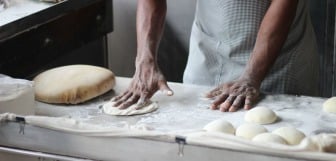How to Become a Bakery Owner: A Step-by-Step Guide
As the demand for fresh and locally-made food continues to rise, there's never been a better time to start your own bakery. Retail bakers can offer a unique and personal touch to their baked goods that can't be found in mass-produced items. But don't let the idea of starting a business intimidate you. With some research and preparation, you can turn your passion for baking into a sweet success.
In this in depth blog, we'll cover everything from developing a business plan to establishing an online presence. You'll learn how to choose a location, purchase equipment, and create a menu that will have customers lining up.
So let's get baking and turn your dream of owning a bakery into a reality!
Step 1: Get qualified
Before you start baking up a storm and dreaming of your own bakery, consider some important qualifications. But don't worry, it's not all boring stuff! And it’s not entirely necessary either - we added these steps for if you want to be super prepared for what lies ahead in your bakery-owning dream.
First, let's talk about education. While a high school diploma isn't always required, it's a great foundation to have. You'll develop essential math skills that will come in handy when measuring ingredients for your favorite baked goods. Plus, you'll have a solid foundation for further education.
Now, let's talk about culinary school. If you're really serious about becoming a baking pro, culinary school is a fantastic way to learn the technical skills you'll need to master in the kitchen. Not only will you learn about baking techniques, but you'll also gain valuable business and marketing skills that will help you run a successful bakery in the future.
If you're not quite ready for culinary school yet, don't worry! You can start gaining experience by working in counter service positions at bakeries or cafes. This will help you develop customer service skills, learn about cash handling, and get hands-on experience with basic baking techniques. Plus, you'll have the opportunity to observe successful bakers and learn from their techniques and business practices.
Last but not least, let's talk about math. We know, we know, it's not everyone's favorite subject. But precise measurements are crucial to success in baking. Not to mention you’ll need a basic knowledge of math to understand profit margins, taxes and all the other admin that goes into running a successful bakery business. To become a successful baker, you'll need to be comfortable with fractions and percentages. Don't worry if math isn't your strong suit, though. With practice and patience, you can improve your skills over time.
So, before you start daydreaming about your own bakery, make sure you've got the qualifications you need. With a high school diploma, counter service experience, and possibly attending culinary school, you'll be well on your way to mastering the pastry arts and making your sweet dreams come true!
Step 2: Conduct market research
Before you start measuring ingredients and firing up the oven, doing some market research is crucial. This step is like the yeast in bread - it's not the tastiest part, but it's essential for ensuring your bakery will rise to the occasion. You want to make sure there's a demand for your baked goods and that you can compete with other bakeries in the area.
To begin, you'll want to identify your target audience. Are you catering to health-conscious customers who want gluten-free and vegan options, or do you specialize in indulgent pastries for those with a sweet tooth? Maybe you're focusing on wedding cakes or artisan bread. Whatever your specialty, knowing who your customers are and what they want is important.
Next, take a look at your competition. Are there other bakeries in the area offering similar products? How can you differentiate yourself and stand out? Maybe you offer unique flavors or use locally-sourced ingredients. Do some taste testing and see what the competition is offering.
Finally, look at the demand for baked goods in your area. Are there other grocery stores or markets that carry baked goods? Are they selling out quickly? You could also look at online search trends to see what people in your area are searching for. For example, if there's a high demand for gluten-free cupcakes, you'll want to make sure you have that on your menu.
Once you’ve taken the above steps, you’ll have a great understanding of the market demand for bakeries in your area, and have defined a few target audiences.
Step 3: Develop a business plan
Now that you've done your market research, it's time to whip up a bakery business plan. This is like your recipe for success as a retail baker. Just like you wouldn't bake a cake without a recipe, you don't want to start a bakery business without a plan.
Your business plan will help you determine the necessary startup costs, forecast revenue, and set goals for your bakery business. You'll want to include information about your target market, competition, and marketing strategy. It's also important to outline the products you'll be selling, your pricing strategy, and your staffing needs.
As a small business owner, your bakery business plan should also include financial projections and a plan for managing cash flow. This will help you secure financing and ensure you stay profitable in the long run.
Don't be intimidated by the idea of developing a bakery business plan. It doesn't have to be as complex as a multi-layered cake. There are plenty of resources and templates available online to help you get started. And once you have your plan in place, you'll have a clear direction for your bakery business and be better equipped to tackle any challenges that come your way.
So, get out your mixing bowl and start developing that bakery business plan. With a little bit of planning and a lot of passion, you'll be well on your way to sweet success as a retail bakery.
Step 4: Choose a location and equipment
Now that you've got your business plan sorted, it's time to choose a location and equipment for your bakery. This step is like selecting the perfect cake pan and oven for your baked goods. You want to make sure you have the right tools to create a successful bakery.
First, let's talk about location. Retail bakers will want to choose a location that's easily accessible for customers and has plenty of foot traffic. You may also want to consider the surrounding businesses and if they complement or compete with your bakery. Don't forget to factor in the cost of rent and utilities when choosing a location.
Next, it's time to equip your bakery. As a professional baker, you'll need bakery equipment that can handle the demands of food preparation and baking. This may include mixers, ovens, refrigerators, and display cases. You'll also want to invest in quality ingredients and supplies to ensure the best possible baked goods for your customers.
Remember, your bakery equipment doesn't have to be the most expensive. You can find great deals on gently used equipment or look for more affordable options when starting out. However, it’s also important to regularly maintain and replace equipment to ensure the safety and quality of your baked goods.
Lastly - let’s talk about the less fun (but very important) bit: health and safety. You’ll need to get the relevant supplies in place and make sure you’re compliant with health and safety guidelines. This includes training on appropriate handling of machinery, to make sure you’re keeping the place clean and tidy. We know it’s not the interesting part, but it is essential!
Choosing the right location and equipment is crucial for the success of your bakery business. So, take your time and don't rush into any decisions. With the right location and equipment, you'll be well on your way to creating delicious baked goods and becoming a successful retail baker.
Epos Now Complete Solution: The Best for Business
Delight staff and customers alike with one-tap ordering, omnichannel sales and real-time reporting so you can respond instantly on those busy days.
Step 5: Develop a menu and pricing strategy
Now that you've got your location and equipment sorted, it's time to focus on the fun stuff - your menu! This step is like adding frosting to your cake. It's where you get to showcase your creativity and offer customers delicious baked goods.
Create your menu:
When developing your menu, consider your target market and competition (back when you did you research in step 2 of this guide). What types of baked goods do they want? Are there any gaps in the market that you can fill? Can you offer festive goods for special occasions? Don't be afraid to get creative and offer unique flavors or products.
Your menu should also include a variety of options at different price points. This will cater to customers with different budgets and increase your chances of making a sale. Make sure to include popular items like cupcakes, cookies, and bread, but also consider offering seasonal specials and rotating your menu to keep things fresh.
Determine your pricing strategy:
Determining your pricing strategy is just as important as developing your menu. You'll want to price your products competitively while also ensuring you're making a profit. Consider the cost of ingredients, labor, and overhead when setting your prices.
It's also important to consider the local market and what your competition is charging. If your prices are significantly higher than your competitors, it may be difficult to attract lots of customers. On the other hand, if your prices are too low, you may get lots of customers, but not be making a profit.
Don't be afraid to adjust your prices as needed. Keep track of your costs and sales to ensure you're staying profitable. You may also want to consider offering discounts or promotions to attract new customers.
Developing a menu and pricing strategy is an exciting step in becoming a successful bakery owner. With a little bit of creativity and business savvy, you'll be well on your way to serving up delicious baked goods and satisfying your customers' cravings.
Step 6: Establish an online presence
In today's digital age, establishing an online presence is essential for any successful bakery. Here are some tips to make sure you're making the most of your online presence:
Build a website:
Your website should be the go-to place for customers to check out your menu, pricing, and location information. Make sure your website is visually appealing and easy to navigate. Include high-quality photos of your baked goods to entice customers to visit your bakery. And don't forget to make sure your website is mobile-friendly since many customers will be viewing it on their phones.
Be active on social media:
Social media is a great way to engage with your customers and showcase your baked goods. Make sure you're active on all the major platforms, including Facebook, Instagram, and Twitter. Here are a few ways you can use social media effectively for you business:
- Post photos of your dessert menu
- Create short behind-the-scenes videos of you making popular items
- Share news about your baking business
- Interview staff and get them to relive some of their favorite stories while working at your bakery
- Give out discount codes to loyal followers
- Reshare customer content when they tag you in their posts
- Consider hosting social media contests, such as getting your followers to submit pastry arts
- Promote local events, charities or companies that you support
- Reveal special request items, and the story behind them
- Show your expertise and give tips on creating the perfect bread or cake from home
- Respond to comments and messages from your followers
And don't be afraid to get creative on your social media!
Offer online ordering:
Online ordering is becoming increasingly popular, so it's important to offer this option to your customers. There are a variety of online ordering systems available, so choose one that works best for your bakery. This will not only make it easier for customers to place orders, but it can also help increase sales.
Utilize email marketing tactics
Email marketing is a powerful tool for keeping your customers in the loop. Offer exclusive discounts and promotions to your email subscribers, and send regular newsletters with updates on your menu and any upcoming specials.
Don't have an email list yet? Consider offering a discount or free baked goods to customers who sign up in-store. And make sure to regularly promote it on your social media too - it’s good to use multiple marketing channels to build your audience up.
Collaborate with other businesses:
Collaborating with other local businesses can help increase your reach and attract new customers to your bakery. Consider partnering with a coffee shop or a specialty food store to offer joint promotions or events. You could also collaborate with a local charity to donate a portion of your sales to a good cause.
By utilizing these tips and establishing a strong online presence, you can make sure your baked goods are getting the attention they deserve and attract new customers to your bakery. Don't be afraid to get creative and have some fun with it!
Step 7: Open your bakery
Congratulations, you're almost ready to launch your bakery! Here are some tips to make sure your grand opening is a success:
Get a bakery point of sale (POS):
A bakery point of sale system is essential for any new business, including bakeries. This will allow you to manage your inventory, process transactions, and track sales. You can find a variety of bakery POS systems available, so do some research to find one that meets your needs.
TIP: The best bakery POS systems will offer extra tools to help you run your business - from marketing to accounting. This is super useful in keeping all your business data in one system.
Host a grand opening event:
Hosting a grand opening event is a great way to introduce your bakery to the community and attract new customers. Consider offering special discounts or promotions for those who attend. You could also partner with a local charity and donate a portion of your sales from the event.
Spread the word:
Make sure to spread the word about your grand opening through social media, email marketing, and flyers around town. Consider reaching out to local media outlets to see if they would be interested in covering your opening.
Provide samples:
Providing samples of your baked goods is a great way to entice customers to come into your bakery and try your products. Set up a table outside your bakery or walk around town and offer samples to passersby.
Offer specials:
Consider offering special deals or promotions during your grand opening week to encourage customers to come back and try more of your baked goods. You could offer a free cookie with any purchase or a discount on your most popular item.
Attend baker networking events:
Attending baker networking events is a great way to connect with other bakers in your area and learn about new business opportunities. Consider joining your local small business association to stay up-to-date on industry news and events.
Launching a bakery can be a lot of work, but with these tips, you can make sure your grand opening is a success and set yourself up for a thriving bakery business. Remember to have fun and enjoy the process of sharing your pastry arts and baking abilities with the world!
Rolling in the dough: final thoughts on becoming a bakery owner
Congratulations, you've made it to the end of our step-by-step guide on becoming a bakery owner! By now, you should have a better understanding of what it takes to turn your passion for baking into a successful business.
Remember, becoming a bakery owner takes time, dedication, and a whole lot of flour! But with the right education, equipment, marketing tactics, and of course, baked goods, you can make your dreams a reality.
Don't be afraid to get creative with your menu, develop your own unique brand, and network with other specialty bakers in your area. And if you ever need inspiration, just remember the wise words of Julia Child: "A party without cake is just a meeting."
So, whether you're just starting out or already rolling in the dough, keep following your passion and never stop learning. With hard work and a little bit of sugar and spice, you can bake your way to success as a bakery owner.
For more information on launching and managing a bakery, check out our additional resources below:




